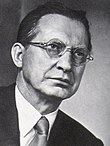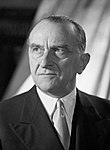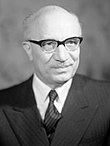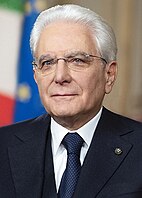List of presidents of Italy
- Top left: Enrico De Nicola was the first president of the Italian Republic.
- Top right: Antonio Segni was the first president to resign from office.
- Bottom left: Giorgio Napolitano was the first president to be re-elected.
- Bottom right: Sergio Mattarella is the current president of the Italian Republic and the longest-serving president in Italian history.
The president of Italy (Italian: Presidente della Repubblica) is the head of state of the Italian Republic. Since 1948, there have been 12 presidents of Italy.
The official residence of the president is the Quirinal Palace in Rome. Among the Italian presidents, three came from Campania (all from Naples), three from Piedmont, two each from Sardinia (both from Sassari) and from Tuscany, one from Liguria, and one from Sicily. No woman has ever held the office.
Election
[edit]The president of the Republic is elected by Parliament in a joint session of the Chamber of Deputies and the Senate. In addition, the 20 regions of Italy appoint 58 representatives as special electors. Three representatives come from each region, save for the small Aosta Valley which appoints one, so as to guarantee representation for all localities and minorities.
According to the Constitution, the election must be held in the form of secret ballot, with all senators, all deputies and the 58 regional representatives all voting. A two-thirds vote is required to elect on any of the first three rounds of balloting and after that a majority suffices. The election is presided over by the Speaker of the Chamber of Deputies, who calls for the public counting of the votes. The vote is held in the Palazzo Montecitorio, home of the Chamber of Deputies, which is expanded and re-configured for the event.
The president assumes office after having taken an oath before Parliament and delivering a presidential address. Presidents are elected to serve a seven-year term. Giorgio Napolitano was the first president to be elected to a second term in 2013, followed by Sergio Mattarella in 2022.
Presidents of the Italian Republic (1948–present)
[edit]| PLI DC PSDI PSI DS Independent | ||||||||
|---|---|---|---|---|---|---|---|---|
| Portrait | Name (Birth–Death) |
Term of office | Party | Election | Ref. | |||
| Took office | Left office | |||||||

|
Enrico De Nicola (1877–1959) |
1 January 1948[a] | 12 May 1948 | Italian Liberal Party | 1947 | [1] | ||
| 132 days | ||||||||

|
Luigi Einaudi (1874–1961) |
12 May 1948 | 11 May 1955 | Italian Liberal Party | 1948 | [2] | ||
| 6 years, 364 days | ||||||||

|
Giovanni Gronchi (1887–1978) |
11 May 1955 | 11 May 1962 | Christian Democracy | 1955 | [3] | ||
| 7 years, 0 days | ||||||||

|
Antonio Segni (1891–1972) |
11 May 1962 | 6 December 1964[b] | Christian Democracy | 1962 | [4] | ||
| 2 years, 209 days | ||||||||

|
Giuseppe Saragat (1898–1988) |
29 December 1964 | 29 December 1971 | Italian Democratic Socialist Party | 1964 | [5] | ||
| 7 years, 0 days | ||||||||

|
Giovanni Leone (1908–2001) |
29 December 1971 | 15 June 1978[c] | Christian Democracy | 1971 | [6] | ||
| 6 years, 168 days | ||||||||

|
Sandro Pertini (1896–1990) |
9 July 1978 | 29 June 1985[d] | Italian Socialist Party | 1978 | [7] | ||
| 6 years, 355 days | ||||||||

|
Francesco Cossiga (1928–2010) |
3 July 1985 | 28 April 1992[e] | Christian Democracy | 1985 | [8] | ||
| 6 years, 300 days | ||||||||

|
Oscar Luigi Scalfaro (1918–2012) |
28 May 1992 | 15 May 1999[d] | Christian Democracy[f] | 1992 | [9] | ||
| 6 years, 352 days | ||||||||

|
Carlo Azeglio Ciampi (1920–2016) |
18 May 1999 | 15 May 2006[d] | Independent[g] | 1999 | [10] | ||
| 6 years, 362 days | ||||||||

|
Giorgio Napolitano (1925–2023) |
15 May 2006 | 14 January 2015[h] | Democrats of the Left / Independent[i] |
2006 2013 |
[11] | ||
| 8 years, 244 days | ||||||||

|
Sergio Mattarella (born 1941) |
3 February 2015 | Incumbent | Independent[j] | 2015 2022 |
[12] | ||
| 9 years, 356 days | ||||||||
Timeline
[edit]
Substitute of the head of state
[edit]The Acting President of the Republic (Italian: Presidente supplente della Repubblica) is an office not explicitly provided for in the Italian Constitution, but deriving from the provision contained in the article 86.[13] On various occasions, officials had to intercede in the absence of a head of state (notably in the case of a president's resignation or ill health). Only Enrico De Nicola, who was elected to be provisional head of state by the Constitutional Assembly on 28 June 1946, had an official title and took residence in the Quirinal Palace.[14] The others took the powers, but not the title of Head of State. After the adoption of the Italian Constitution in 1948, the president of the Senate is eligible to take the powers of head of state in case of absence of the President of the Republic.
| DC PLI PRI PPI PD Independent | |||||||
|---|---|---|---|---|---|---|---|
| Portrait | Name (Birth–Death) |
Term of office | Party | Election | Ref. | ||
| Took office | Left office | ||||||

|
Alcide De Gasperi (1881–1954) |
13 June 1946 | 1 July 1946 | Christian Democracy | — | [k] | |
| 18 days | |||||||

|
Enrico De Nicola (1877–1959) |
1 July 1946 | 31 December 1947 | Italian Liberal Party | 1946 1947 |
[l] | |
| 1 year, 183 days | |||||||

|
Cesare Merzagora (1898–1991) |
6 December 1964 | 29 December 1964 | Independent | — | [m] | |
| 23 days | |||||||

|
Amintore Fanfani (1908–1999) |
15 June 1978 | 9 July 1978 | Christian Democracy | — | [n] | |
| 24 days | |||||||

|
Francesco Cossiga (1928–2010) |
29 June 1985 | 3 July 1985 | Christian Democracy | — | [o] | |
| 4 days | |||||||

|
Giovanni Spadolini (1925–1994) |
28 April 1992 | 28 May 1992 | Italian Republican Party | — | [p] | |
| 30 days | |||||||

|
Nicola Mancino (born 1931) |
15 May 1999 | 18 May 1999 | Italian People's Party | — | [q] | |
| 3 days | |||||||

|
Pietro Grasso (born 1944) |
14 January 2015 | 3 February 2015 | Democratic Party | — | [r] | |
| 20 days | |||||||
See also
[edit]- Lists of office-holders
- King of Italy, for previous Italian heads of state between 1861 and 1946
- List of prime ministers of Italy
- Politics of Italy
- Prime Minister of Italy
Notes
[edit]- ^ De Nicola was already provisional head of state since 1 July 1946.
- ^ After suffering a serious cerebral hemorrhage, Segni resigned for health reasons, becoming the first president to do so.
- ^ After being involved in a bribery scandal, Leone resigned.
- ^ a b c Resigned in order to bring forward the inauguration ceremony of the President-elect.
- ^ Cossiga resigned in order to favor the resolution of the political crisis after the 1992 general election.
- ^ Scalfaro left the Christian Democracy in 1992, when he was elected president. In 1994 the DC was disbanded and Scalfaro would never re-join a party.
- ^ Ciampi was a member of the Action Party, which was dissolved in 1947.
- ^ At 89 years old, Napolitano resigned due to age reasons.
- ^ Napolitano was a member of the Italian Communist Party, of the Democratic Party of the Left and of the Democrats of the Left until his election as President in 2006.
- ^ Mattarella was a member of the Christian Democracy, of the Italian People's Party, of The Daisy and of the Democratic Party, but he quit political commitment when he left the Parliament in 2008.
- ^ De Gasperi exercised the powers of provisional head of state as Prime Minister of Italy between the departure of King Umberto II on 13 June 1946 and the proclamation of Enrico De Nicola as head of state by the Constitutional Assembly on 1 July 1946.
- ^ De Nicola was the only provisional president who had the title and not only the powers of provisional head of state. He assumed the office on 1 July 1946 and officially became the president of the Republic on 1 January 1948 as ordered by the new Constitution.
- ^ Merzagora, as President of the Senate, assumed temporary powers for President Antonio Segni after his cerebral hemorrhage of 10 August 1964 and assumed full powers after his resignation of 6 December and until 29 December 1964.
- ^ Fanfani, as President of the Senate, assumed powers from President Giovanni Leone after his resignation for a bribery scandal on 15 June 1978. He exercised the powers until 9 July 1978.
- ^ Cossiga, as President of the Senate, assumed powers from President Sandro Pertini on 29 June 1985, just four days before taking office as President.
- ^ Spadolini, as President of the Senate, assumed powers from President Francesco Cossiga on 28 April 1992. He exercised the powers until 28 May 1992.
- ^ Mancino, as President of the Senate, assumed powers from President Oscar Luigi Scalfaro on 15 May 1999. He exercised the powers until 18 May 1999.
- ^ Grasso, as President of the Senate, assumed powers from President Giorgio Napolitano on 14 January 2015. He exercised the powers until 3 February 2015.
References
[edit]- ^ "La biografia del Presidente De Nicola". Presidenza della Repubblica italiana.
- ^ "La biografia del Presidente Einaudi". Presidenza della Repubblica italiana.
- ^ "La biografia del Presidente Gronchi". Presidenza della Repubblica italiana.
- ^ "La biografia del Presidente Segni". Presidenza della Repubblica italiana.
- ^ "La biografia del Presidente Saragat". Presidenza della Repubblica italiana.
- ^ "La biografia del Presidente Leone". Presidenza della Repubblica italiana.
- ^ "La biografia del Presidente Pertini". Presidenza della Repubblica italiana.
- ^ "La biografia del Presidente Cossiga". Presidenza della Repubblica italiana.
- ^ "La biografia del Presidente Scalfaro". Presidenza della Repubblica italiana.
- ^ "La biografia del Presidente Ciampi". Presidenza della Repubblica italiana.
- ^ "La biografia del Presidente Napolitano". Presidenza della Repubblica italiana.
- ^ "La biografia del Presidente Mattarella". Presidenza della Repubblica italiana.
- ^ Articolo 86, Costituzione della Repubblica Italiana, Brocardi
- ^ Decreto legislativo luogotenenziale, parlalex.it
External links
[edit]- (in Italian) Presidenza della Repubblica – official site of the president of Italian Republic




